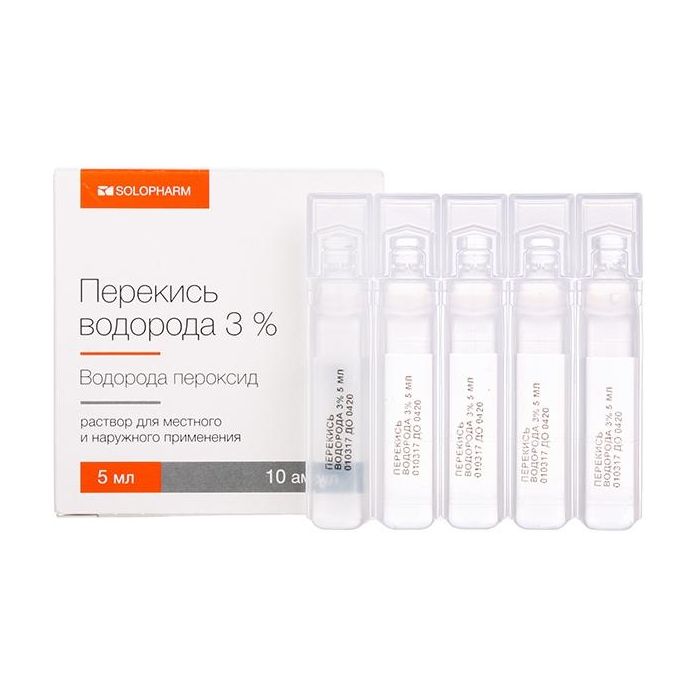hydrogen peroxide | Hydrogen peroxide-SOLOpharm Politvist solution 3% 5 ml ampoules plastic 10 pcs.
Special Price
$14.70
Regular Price
$22.00
In stock
SKU
BID704402
Pharmacological action
Antiseptic from the group of oxidants. When hydrogen peroxide comes in contact with damaged skin or mucous membranes, active oxygen is released,
in this case, mechanical purification and inactivation of organic substances (proteins, blood, pus) occurs.
The antiseptic effect is not sterilizing, with its use there is a temporary decrease in the number of microorganisms.
Excessive foaming contributes to thrombosis and stopping bleeding from small vessels.
Antiseptic from the group of oxidants. When hydrogen peroxide comes in contact with damaged skin or mucous membranes, active oxygen is released,
in this case, mechanical purification and inactivation of organic substances (proteins, blood, pus) occurs.
The antiseptic effect is not sterilizing, with its use there is a temporary decrease in the number of microorganisms.
Excessive foaming contributes to thrombosis and stopping bleeding from small vessels.
Pharmacological action
Antiseptic from the group of oxidants. When hydrogen peroxide comes in contact with damaged skin or mucous membranes, active oxygen is released,
in this case, mechanical purification and inactivation of organic substances (proteins, blood, pus) occurs.
The antiseptic effect is not sterilizing, with its use there is a temporary decrease in the number of microorganisms.
Excessive foaming contributes to thrombosis and stopping bleeding from small vessels.
Indications
Inflammatory diseases of the mucous membranes
purulent wounds
capillary bleeding from superficial wounds
nasal bleeding
for disinfection and deodorization: stomatitis, tonsillitis, tonsillitis, gynecological diseases.
Contraindications
Hypersensitivity to the components of the drug.
Caution: decompensated liver and kidney diseases, hyperthyroidism, herpetiform dermatitis.
Special instructions
It is not recommended to use the drug under occlusive dressings.
Avoid contact with eyes!
Do not use for irrigation of cavities!
Unstable in an alkaline environment, in the presence of alkali metals, complex radicals of certain oxidants, as well as in light and heat.
Wound treatment with 3% hydrogen peroxide solution does not guarantee protection against tetanus and other wound infections.
Influence on the ability to drive vehicles and mechanisms
Not studied.
Composition of
100 ml of the preparation contain:
Active substance:
Hydrogen peroxide from 7.5 to 11 g depending on the hydrogen peroxide content in the starting substance equivalent to hydrogen peroxide 3.0 g
Excipient:
Wo and for injection to 100 ml The composition
Dosage and Administration
Topically, topically.
For external use, a 1-3% solution is used, for rinsing the mouth and throat, applying to the mucous membranes - 0.25% solution (3% solution is diluted with water in a ratio of 1:11).
Damaged areas of the skin or mucous membrane are treated with a cotton or gauze swab moistened with a solution of the drug. Tampons should be kept with tweezers. Perhaps jet irrigation of the wound surface.
Side effects
Burning at the time of wound treatment, allergic reactions.
Overdose
Symptoms: irritation of the upper respiratory tract (burn, laryngo-bronchospasm) when ingested - irritation of the mucous membranes of the gastrointestinal tract, hemolysis, hemoglobinuria lethal dose - about 3 g.
Treatment: gastric lavage with 0.5% sodium thiosulfate solution sodium bicarbonate solution in / in the introduction of sodium thiosulfate 30% - up to 300 ml.
active substance
Hydrogen peroxide
Antiseptic from the group of oxidants. When hydrogen peroxide comes in contact with damaged skin or mucous membranes, active oxygen is released,
in this case, mechanical purification and inactivation of organic substances (proteins, blood, pus) occurs.
The antiseptic effect is not sterilizing, with its use there is a temporary decrease in the number of microorganisms.
Excessive foaming contributes to thrombosis and stopping bleeding from small vessels.
Indications
Inflammatory diseases of the mucous membranes
purulent wounds
capillary bleeding from superficial wounds
nasal bleeding
for disinfection and deodorization: stomatitis, tonsillitis, tonsillitis, gynecological diseases.
Contraindications
Hypersensitivity to the components of the drug.
Caution: decompensated liver and kidney diseases, hyperthyroidism, herpetiform dermatitis.
Special instructions
It is not recommended to use the drug under occlusive dressings.
Avoid contact with eyes!
Do not use for irrigation of cavities!
Unstable in an alkaline environment, in the presence of alkali metals, complex radicals of certain oxidants, as well as in light and heat.
Wound treatment with 3% hydrogen peroxide solution does not guarantee protection against tetanus and other wound infections.
Influence on the ability to drive vehicles and mechanisms
Not studied.
Composition of
100 ml of the preparation contain:
Active substance:
Hydrogen peroxide from 7.5 to 11 g depending on the hydrogen peroxide content in the starting substance equivalent to hydrogen peroxide 3.0 g
Excipient:
Wo and for injection to 100 ml The composition
Dosage and Administration
Topically, topically.
For external use, a 1-3% solution is used, for rinsing the mouth and throat, applying to the mucous membranes - 0.25% solution (3% solution is diluted with water in a ratio of 1:11).
Damaged areas of the skin or mucous membrane are treated with a cotton or gauze swab moistened with a solution of the drug. Tampons should be kept with tweezers. Perhaps jet irrigation of the wound surface.
Side effects
Burning at the time of wound treatment, allergic reactions.
Overdose
Symptoms: irritation of the upper respiratory tract (burn, laryngo-bronchospasm) when ingested - irritation of the mucous membranes of the gastrointestinal tract, hemolysis, hemoglobinuria lethal dose - about 3 g.
Treatment: gastric lavage with 0.5% sodium thiosulfate solution sodium bicarbonate solution in / in the introduction of sodium thiosulfate 30% - up to 300 ml.
active substance
Hydrogen peroxide
Write Your Own Review

